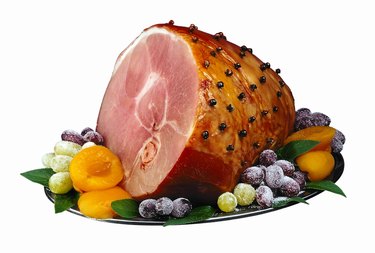
Gout is the most common inflammatory disease among men and affects women, according to the Centers for Disease Control and Prevention. Symptoms can appear in flare-ups called gout "attacks" or they can become chronic. In addition to medical treatment, when needed, an appropriate diet can help you manage your symptoms. Although pork contains valuable amounts of protein nutrients, it may contribute to gout symptoms. Seek guidance from your doctor or dietitian before altering your diet.
Risks
Video of the Day
Gout develops when your levels of the mineral uric acid become excessive and form deposits in a single joint. Because natural substances called purines stimulate uric acid production, a low-purine diet may help lower your uric acid levels, according to MayoClinic.com. A purine-rich diet, on the other hand, can have opposite effects. Because pork is moderately high in purines, consuming excessive or frequent amounts can increase your uric acid levels, leading to worsened gout symptoms. Fatty cuts of pork and pork prepared with butter, cheese or high-fat creamy sauces may worsen inflammation by contributing saturated fat to your diet.
Video of the Day
Pork Suggestions
To guard against gout symptoms, MayoClinic.com recommends limiting meat to 4 to 6 ounces per day and opting more often for plant-based protein sources like beans, lentils and tofu. When you do consume pork, choose lean cuts prepared with nutritious ingredients. Instead of butter, for example, use modest amounts of olive or canola oil, which are unsaturated fat sources. Low-fat cooking techniques include baking, broiling, steaming and grilling.
Other Foods
The highest-purine foods include organ meats like kidney and liver, yeast and oily fish including salmon, mackerel and herring. To reach or maintain a healthy body weight -- which helps minimize inflammation caused by added pounds -- eat more fiber-rich foods; fiber promotes appetite control. Particularly fiber-rich foods include beans, lentils, whole grains, raspberries, peas, broccoli and artichokes. Antioxidant-rich foods like blueberries, tomatoes, cherries, squash and bell peppers also can help reduce gout symptoms, according to the University of Maryland Medical Center. Consuming low-fat milk and yogurt routinely may help by reducing your uric acid levels.
Clinical Evidence
In a study published in "Arthritis & Rheumatism" in 2005, the dietary habits and uric acid levels of 14,809 adults over age 20 were analyzed over six years. Participants who consumed diets rich in meat or seafood had significantly higher uric acid levels contrasted with participants who did not. Consuming dairy products once or more per day, on the other hand, was positively linked with reduced uric acid levels.
- Centers for Disease Control and Prevention: Gout Basics
- MayoClinic.com: Gout Diet
- Acumedico.com: Purine Table
- "Arthritis Today"; Inflammatory Foods; Denise Lynn Mann
- University of Maryland Medical Center: Gout
- "Arthritis & Rheumatism"; Intake of Purine-Rich Foods, Protein and Dairy Products and Relationship to Serum Levels of Uric Acid; Hyon K. Choi, et al.; January 2005
Is this an emergency? If you are experiencing serious medical symptoms, please see the National Library of Medicine’s list of signs you need emergency medical attention or call 911.